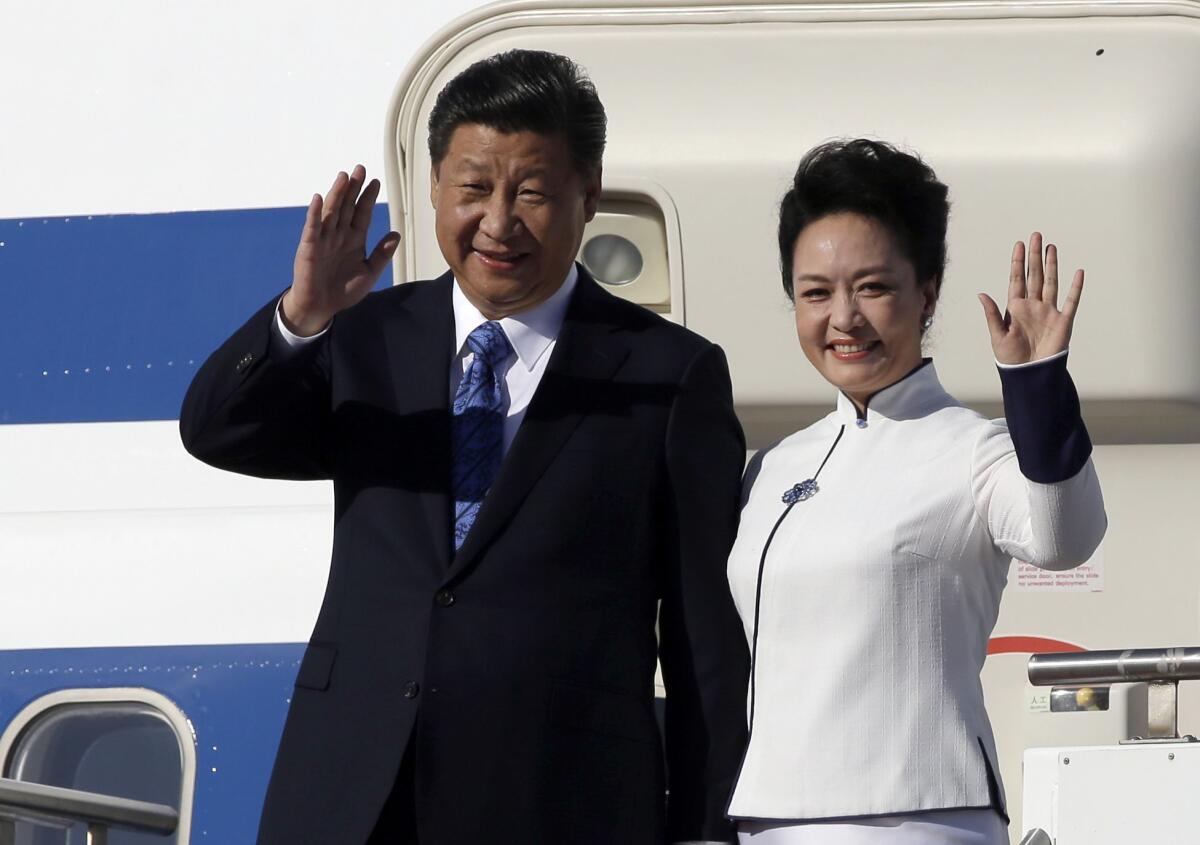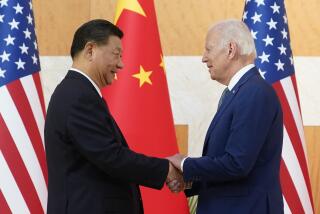Formal or friendly? Protocol could shape how China’s Xi comes across in Seattle

Chinese President Xi Jinping and his wife, Peng Liyuan, wave upon arrival at Boeing Field in Everett, Wash., on Sept. 22.
- Share via
Reporting from Beijing — When Chinese leader Deng Xiaoping came to the United States in 1979, one of the breakthrough moments occurred at a rodeo near Houston when the diminutive Communist leader donned a 10-gallon hat.
The moment caught by cameras created a signature image that suggested to many Americans the possibility of a new relationship with Beijing after decades of fearfulness and suspicion.
His successor, President Hu Jintao, was not so fortunate. His speech on the South Lawn of the White House in 2006 was interrupted by a protester shouting in Chinese, demanding a stop to persecution of members of the Falun Gong spiritual movement and warning Hu that his “days were numbered.”
Now comes Chinese President Xi Jinping, whose Boeing 747 touched down Tuesday shortly after 9 a.m. PDT at the Seattle area’s King County International Airport -- also known, appropriately enough, as Boeing Field. The city’s downtown was laced with security barricades. Protesters were gathered. Warnings of apocalyptic traffic snarls had been issued.
For all the pomp and expectations in Seattle, Xi’s initial stop in the U.S. before heading to the East Coast, his government and the Obama administration remain at loggerheads over issues including cyber-espionage, human rights and island-building in the South China Sea.
Despite the issues and potential protests, Xi’s first state visit to the U.S. offers a rare opportunity for the Chinese president to cut through entrenched negative American perceptions of his nation and recalibrate attitudes. Chinese officials say Xi is eager to connect with the general public.
Yet analysts say expectations are low for any “cowboy hat” moment.
In large part, that’s because Beijing has put a high premium on protocol for the visit, seeking highly ritualized interactions that will play well back home on state-run Chinese TV. It’s also because U.S. organizers are at pains to avoid a repeat of Hu’s heckler moment.
“For Xi, in terms of protocol, this trip is more targeted toward the domestic audience, and so I expect protocol to be very rigorously traditional,” said Tom Doctoroff, author of “What Chinese Want” and Asia chief executive of the J. Walter Thompson advertising agency.
“I do think Xi has inner cool, and if he were able to go a little off-script, there’s an opportunity to bond with the American people. ... But I think he’s going to miss the opportunity. He’s so concerned with power projection back home that he’s going to miss the chance to relax and meet the American people.”
According to a Pew opinion survey this spring, more than two-thirds of American respondents said the $1.2 trillion of U.S. debt held by China was a very serious problem, while 60% regarded the loss of jobs to China as a very serious concern. About 52% considered the U.S. trade deficit with China a very serious problem, according to the survey.
Just how much Xi might be able to soften such opinions by showing a more human touch is unknown. In an appearance with U.S. business leaders in Beijing just days before heading to Seattle, he said he “will be happy to meet with more people from all walks of life in the U.S.”
His stated belief was that his visit could “further strengthen the understanding between two nations and the friendship between people of both countries and push forward the relationship between two nations.”
But organizers of his visit considered -- and apparently rejected -- several man-of-the-people outings, such as having Xi attend an National Football League game in the New York City area or a soccer game in Seattle.
As of now, the most public event on Xi’s schedule is an outing to a high school in Tacoma, Wash., that he visited on a previous U.S. trip.
Xi’s relaxed-versus-stiff conundrum underscores fundamental cultural differences between the U.S. and China that will be on display throughout the six-day visit, experts in cross-cultural communication say.
Take the first day’s schedule in Seattle. No fewer than six “signing ceremonies” are scheduled between Chinese and American government officials and business leaders on various “agreements” and “memorandums of understanding.”
These formalities will involve officials and executives including Gov. Jay Inslee, the Communist Party secretary of Sichuan province, the interim president of the University of Washington, corporate chief executives and even Bill Gates. They will cover a variety of matters including trade and investment, nuclear power and educational initiatives.
And these are hardly the only agreements planned for Xi’s trip. The state-run newspaper China Daily reported Tuesday that the U.S. and China are “likely to seal more than 40 agreements and deals, including a major one on climate change.”
To Americans, the terms of many of these deals may sound suspiciously nebulous: The signatories will “explore a model for cooperation,” or “establish their mutual desire to collaborate,” while affixing their signatures to important-looking certificates in front of a bank of cameras.
But to Chinese, they are essential stepping stones on the road to getting things done, experts in cross-cultural business say.
“Quite honestly, the West couldn’t care less about these things,” said Lothar Katz, author of books including “Negotiating International Business” and a lecturer at the University of Texas-Dallas business school. “But in China, the signing ceremony is considered to have a huge influence on the success; it promises luck if done right and promises doom if it isn’t.”
Part of the disconnect comes from the fact that in Western countries such ceremonies -- along with contract closures, groundbreakings and other business rituals -- typically come at the culmination of a process, not in the early stages.
“It’s like this: We had negotiations, we worked out the details, we had lawyers involved, now we’re at the end of it and we’re going to sign an agreement,” Katz said. “We celebrate the fact that process has led to success, has led to an agreement.”
“In China, the signing of such an agreement is the beginning of a relationship,” Katz said. “It’s not so much for the document; the Chinese actually tend to break contracts, as we’ve painfully experienced, which from a Western perspective is an absolute no-no. But from a Chinese perspective, the expectation is: It’s not the document that’s important, it’s the relationship.”
Westerners and Chinese also often have a disconnect when it comes to ceremonial style. To a Western eye, Chinese-style signing ceremonies and other events seem “extremely formalized, very soulless, very scripted,” Doctoroff said.
“There is not a naturalness, a spontaneity that we [Westerners] naturally associate with self-possessed and evolved individuals,” he said. “Instead, they are seen as fake. And they are, if you take a look from the angle of originality or creativity.”
Westerners who eye-roll at such formalities or regard them as wastes of time do so at their own peril, Doctoroff said. For the Chinese, he explained, the rituals are rooted in Confucian traditions that encourage people to project their status -- within a framework that is ritualized and not individualistic.
“Moments that enable you to conform to the received wisdom of protocol, but also leverage that convention to project your own status, are treasured” in China, he said. These high-protocol moments, he added, provide “a fundamental ritual of mutual ‘face’ exchange.”
“These signing ceremonies are public demonstrations of trust, which are related to face,” he said. “If you do not conform to the ritual, you will prove yourself not to be a reliable partner.”
Staff writer Maria La Ganga in Seattle contributed to this report.
Follow @JulieMakLAT on Twitter for news out of China
More to Read
Sign up for Essential California
The most important California stories and recommendations in your inbox every morning.
You may occasionally receive promotional content from the Los Angeles Times.














